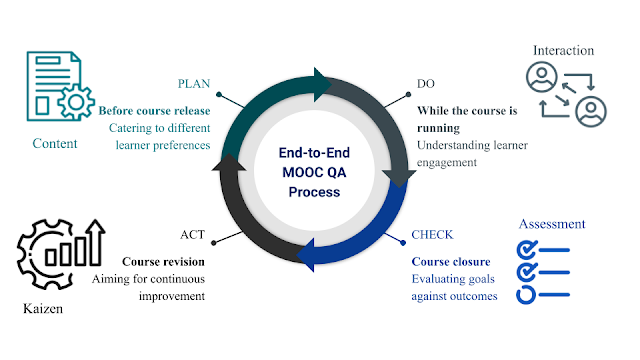Big Data Management: Educational Data Science Approach for an End-to-End Quality Assurance Process for Building Creditworthy Online Courses
Since the inception of Tokyo Tech's Online Education Development Office (OEDO) in 2014, the now Online Content Research and Development (OCRD) Section at the Center for Innovative Teaching and Learning (CITL) has been conducting learning analytics research to improve the learning experience on TokyoTechX. This book chapter which we had been invited to write summarizes the activities we have done so far from a Deming cycle framework.
 |
| Our MOOC quality assurance PDCA cycle |
For a copy of relevant materials (e.g., presentation, paper) or any questions you may have, please feel free to reach out to me through the Contact Me gadget on this blog's sidebar.
Details
Title: Educational Data Science Approach for an End-to-End Quality Assurance Process for Building Creditworthy Online Courses
Authors: May Kristine Jonson Carlon, Sasipa Boonyubol, Nopphon Keerativoranan, Jeffrey S. Cross
Book: Educational Data Science: Essentials, Approaches, and Tendencies
Editor: Alejandro Peña-Ayala
Series: Big Data Management
Publisher: Springer, Singapore
Abstract
Despite for-credit distance education existing since the latter half of the nineteenth century, the creditworthiness of massive open online courses (MOOCs), a form of distance education, remains debatable outside a few domains. This may be due to the perceived lack of quality in MOOCs, either due to the wide variety of MOOCs or the difficulty in translating quality expectations from brick-and-mortar courses to online courses. In this chapter, the quality expectations for stereotypical university credit are explored and compared with emerging patterns in MOOCs. Based on this analysis, a data-driven end-to-end quality assurance (QA) process to bridge the gap is proposed. Portions of this process are demonstrated using the Tokyo Institute of Technology’s (Tokyo Tech) MOOCs as case studies. This demonstration has shown how a modified Deming cycle can provide actionable quality improvement measures at different stages of the MOOC cycle. In particular, each stage has showcased how the most commonly used approaches in educational data science (EDS), namely, educational data mining (EDM) and learning analytics (LA), are applied to gather information, course contents, and learner feedback data from various interested parties as support evidence for for-credit MOOCs. Henceforth, for improving quality assurance, this demonstration helps clarify the concerns regarding the worthiness of the online learning experience.
Comments
Post a Comment